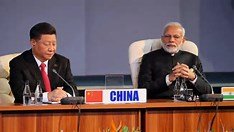The recent exchange of congratulatory messages between Indian Prime Minister Narendra Modi and Taiwanese President Lai Ching-te has triggered a diplomatic stir, with China lodging a protest against India. The incident highlights the complex and often tense relationships between these three significant players in the Indo-Pacific region.
The Exchange of Messages
Thank you @ChingteLai for your warm message. I look forward to closer ties as we work towards mutually beneficial economic and technological partnership. https://t.co/VGw2bsmwfM
— Narendra Modi (@narendramodi) June 5, 2024
On June 5, 2024, Taiwanese President Lai Ching-te congratulated PM Modi on X (formerly Twitter) for his victory in the Lok Sabha Elections. Lai expressed his hope for strengthening the “fast-growing Taiwan-India partnership,” emphasizing collaboration in trade, technology, and other sectors to promote peace and prosperity in the Indo-Pacific region.
In response, PM Modi thanked President Lai, stating, “I look forward to closer ties as we work towards a mutually beneficial economic and technological partnership.” This seemingly routine diplomatic exchange, however, drew a sharp reaction from China.
China’s Protest

The Chinese Foreign Ministry, on June 6, objected strongly to the exchange, reiterating its stance on the one-China principle. Beijing views Taiwan as a renegade province and opposes any form of official interaction between Taiwan and countries with which it has diplomatic relations. Chinese Foreign Ministry spokesperson Mao Ning stated, “There is no such thing as ‘president’ of the Taiwan region,” and urged India to resist what it termed as Taiwan’s “political calculations.”
Mao Ning further emphasized that India has made significant political commitments to the one-China policy and should recognize the importance of adhering to it. She added, “China opposes all forms of official interactions between the Taiwan authorities and countries having diplomatic relations with China. This position is very clear, and India knows this well.”
Taiwan’s Response
#China’s outrage at a cordial exchange between the leaders of 2 democracies is utterly unjustified. Threats & intimidation never foster friendships. #Taiwan🇹🇼 remains dedicated to building partnerships with #India🇮🇳 underpinned by mutual benefit & shared values. https://t.co/B5R1EtXEAO
— 外交部 Ministry of Foreign Affairs, ROC (Taiwan) 🇹🇼 (@MOFA_Taiwan) June 7, 2024
In defense of its diplomatic engagement with India, Taiwan’s Foreign Ministry described China’s reaction as “utterly unjustified.” The Ministry highlighted Taiwan’s commitment to building partnerships with India, founded on mutual benefit and shared democratic values. The Taiwanese Foreign Ministry’s statement on X read, “China’s outrage at a cordial exchange between the leaders of two democracies is utterly unjustified. Threats and intimidation never foster friendships.”
U.S. Perspective
Amid the diplomatic friction, the U.S. State Department weighed in, underscoring that such exchanges of congratulatory messages are a normal part of diplomatic business. U.S. State Department spokesperson Matthew Miller remarked that he hadn’t seen the specific reports but affirmed that these messages are routine diplomatic interactions.
Broader Implications
The diplomatic spat over the congratulatory messages is more than a minor protocol issue; it reflects deeper geopolitical tensions. The one-China principle is a cornerstone of China’s foreign policy, and Beijing is highly sensitive to any actions that might suggest recognition of Taiwan as a separate entity. India, while maintaining diplomatic relations with China, has been increasingly engaging with Taiwan, particularly in economic sectors.
India has not publicly reaffirmed its commitment to the one-China policy since 2010, although it continues to observe it in practice. This diplomatic ambiguity allows India some flexibility in its foreign policy, enabling it to strengthen ties with Taiwan without overtly challenging China’s position.
Growing India-Taiwan Relations
India and Taiwan have been expanding their economic partnership in recent years. Taiwan considers India a critical partner under its ‘New Southbound Policy,’ which aims to reduce Taiwan’s economic dependence on China by strengthening ties with South and Southeast Asian countries. Both nations have also signed a migration agreement to facilitate the employment of Indian workers in Taiwanese industries.
Strategic Concerns
China’s strong reaction to PM Modi’s response might also be influenced by broader strategic concerns. Taiwan’s President Lai Ching-te, viewed by Beijing as a separatist, has been a vocal advocate for Taiwan’s distinct status from China. His inauguration speech and subsequent offers for dialogue, which were rebuffed by China, underscore the ongoing tension. China has responded to Taiwan’s assertiveness with military drills and increased incursions into Taiwanese airspace and waters, signaling its readiness to use force if necessary.
Future Prospects
The diplomatic exchange between PM Modi and President Lai might signal a potential shift in India’s stance on Taiwan. While India has traditionally adhered to the one-China policy, increasing Chinese aggression and the need for strategic alliances in the Indo-Pacific might prompt New Delhi to adopt a more nuanced approach.
India’s recent engagement with Taiwan, coupled with its strained relations with China over the border standoff in eastern Ladakh, suggests that New Delhi is exploring ways to balance its strategic interests. The appointment of a new Chinese ambassador to India after an 18-month gap indicates a potential thaw in bilateral relations, but the underlying tensions remain palpable.
The recent diplomatic exchange between India and Taiwan, and China’s subsequent protest, underscores the intricate and often fraught nature of international relations in the Indo-Pacific. As India navigates its foreign policy amidst these complexities, the balancing act between maintaining its one-China policy and fostering closer ties with Taiwan will be crucial. The evolving dynamics will have significant implications for regional stability and the broader geopolitical landscape.












Comments 1